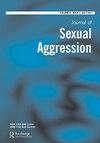Guardians: masculine honour beliefs and perceptions of men’s roles in preventing sexual violence
IF 1.5
4区 社会学
Q2 CRIMINOLOGY & PENOLOGY
引用次数: 0
Abstract
ABSTRACT Across two studies, we examined how individual differences in masculine honour beliefs (MHB) related to perceptions of men’s responsibilities in preventing sexual assaults committed against women. Higher levels of MHB were associated with greater perceptions that a male bystander either witnessing a male perpetrator initiate sexually pressuring behaviours (Study 1), or sexual assault (Study 2), should physically intervene. Higher levels of MHB were also associated with greater perceptions that a male bystander should be held responsible for the sexual assault if he failed to prevent it from occurring (Studies 1 and 2). Our research extends the theoretical framework of masculine honour ideology by demonstrating that masculine honour beliefs may inspire both prosocial (e.g. bystander intervention) and antisocial (e.g. vigilantism on behalf of women) in preventing sexual violence against women.守护者:男性的荣誉信仰和对男性在防止性暴力方面作用的看法
摘要在两项研究中,我们考察了男性荣誉信念(MHB)的个体差异与男性在预防对女性的性侵犯方面的责任感之间的关系。MHB水平越高,男性旁观者就越认为,无论是目睹男性施暴者发起性压力行为(研究1),还是性侵(研究2),都应该进行身体干预。MHB水平越高,人们越认为男性旁观者如果未能阻止性侵的发生,就应该为性侵负责(研究1和2)。我们的研究扩展了男性荣誉意识形态的理论框架,证明男性荣誉信仰在防止对妇女的性暴力方面可能会激发亲社会(如旁观者干预)和反社会(如代表妇女的私刑)。
本文章由计算机程序翻译,如有差异,请以英文原文为准。
求助全文
约1分钟内获得全文
求助全文

 求助内容:
求助内容: 应助结果提醒方式:
应助结果提醒方式:


